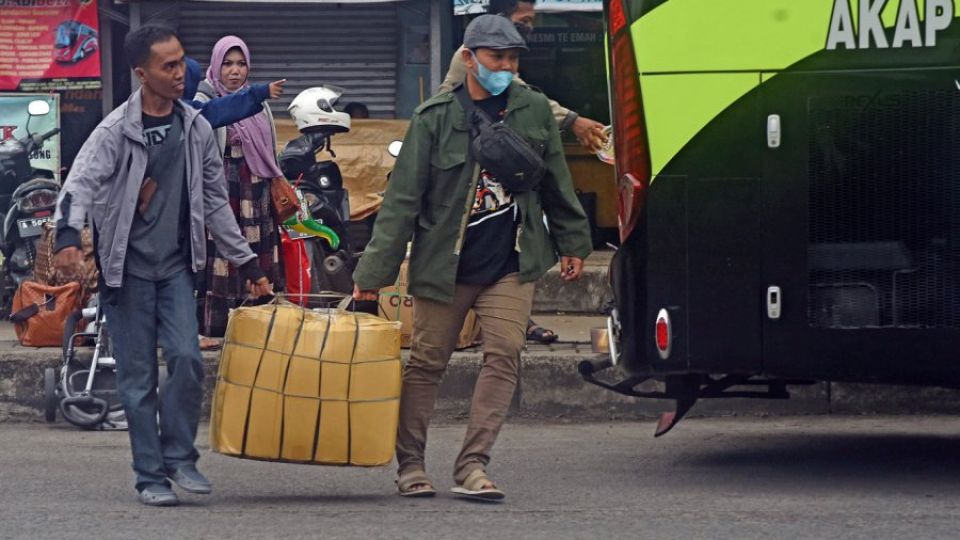April 17, 2023
JAKARTA – President Joko “Jokowi” Widodo is calling on participants in this year’s Idul Fitri mudik (exodus) to complete their COVID-19 vaccinations before departure, as the government contends with the discovery of two imported cases of a new coronavirus strain responsible for case spikes in several countries.
The nation is preparing for the biggest wave of mudik travelers since the start of the pandemic, an expected 120 million people. And for the first time in three years, the public will not be burdened by pandemic mobility restrictions.
When asked how the government plans to deal with a possible case spike over the Muslim holiday, the President said vaccination was key and that people should complete their vaccinations and get their boosters in a timely manner.
“The most important thing is vaccination and booster [shots], so those who haven’t done it need to do it,” Jokowi told reporters during a visit to Depok, West Java, on Thursday.
The President cited results of a serology survey from January suggesting that 99 percent of Indonesians had immunity against COVID-19 but that risks remained for those who had forgone the vaccines.
“Those who have not been vaccinated must be cautious. They urgently need to get their [shots] so that everyone is safe from COVID-19,” Jokowi said.
Despite repeated calls to complete vaccination regimens, the immunization drive has slowed, partially because of the sluggish rollout of booster doses.
As of Thursday, 174 million people had completed their primary vaccinations, and 68 million had received their first booster dose.
President Jokowi said that despite the minor increase in Indonesia’s caseload over the past few days, the situation remained conducive for unencumbered holiday travel.
“There has been a slight increase, but it is still far below the World Health Organization’s standard [for concern], which is 8,000 [daily cases]. We are still at 600 to 900 [new cases per day], so I think the situation is still well under control,” he said.
According to data from the National Disaster Mitigation Agency (BNPB), the country has been reporting over 900 cases a day since Tuesday, with Thursday’s tally falling just short of 1,000 cases. The last time the country reported over 900 cases was in December.
New strain detected
The President’s call comes after officials confirmed the country’s first two known cases of the new Arcturus strain of COVID-19, which is responsible for increased caseloads in several countries, including India and Singapore. Both cases are thought to be imported.
According to Our World in Data, Singapore’s seven-day rolling average for new cases hit a five-month high earlier this month. India, meanwhile, has been reporting over 5,000 new COVID-19 cases daily since April 6. The last time it saw such figures was in September 2022.
So far, the virus strain has been identified in some 20 countries, including Indonesia, state news agency Antara reported on Thursday.
Health Ministry officials confirmed that the COVID-19 subvariant, indexed as XBB.1.16, had been found in two individuals late last month but declined to divulge where they were located. One of the cases involved a foreign traveler.
Health experts have noted that Arcturus can endure antibodies developed through vaccination and natural infection and is highly transmissible.
Nonetheless, the government has played down the severity of the new virus strain, insisting that it is not fatal and that symptoms are not likely to become severe.
Even so, ministry spokeswoman Siti Nadia Tarmizi urged the public to abide by health protocols and get booster doses to prevent transmission during the mudik season.
“We advise the public to get booster shots, wear masks in crowded areas and immediately take COVID-19 tests if they feel sick,” Nadia told The Jakarta Post on Friday.
Arcturus was first detected in late January and is a recombinant variant from BA.2.10.1 and BA.2.75, two descendants of another Omicron variant, BA.2.
According to a study by the University of Tokyo, Arcturus is nearly 1.2 times as transmissible as the XBB.1.5 strain, nicknamed Kraken, another highly contagious version of the Omicron variant.
Last month, the WHO flagged Arcturus as being “under monitoring”.
Maria Van Kerkhove, the WHO’s COVID-19 technical lead, said at a recent press conference that there was no evidence so far to suggest that the strain caused more severe symptoms but called for increased monitoring.
One Indian pediatrician noted that some children thought to be infected with the Arcturus strain were beginning to show symptoms of conjunctivitis, an eye infection, which had not been previously seen with other COVID-19 variants.


